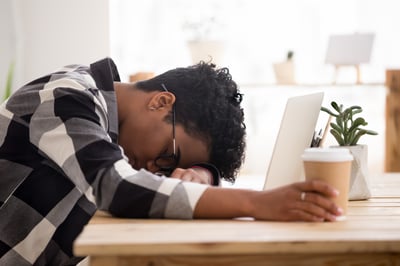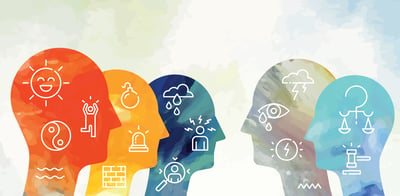
Even during periods of relative calm, employees have to contend with the necessary stresses of having a job.
Commuting to work, staying on task, hitting performance metrics – all of these pressures can add up. But right now, stress has skyrocketed both in and outside the office. Teams are scrambling to acclimate, adopting new work from home policies or workplace safety protocols, meaning stress is at an all-time high. According to sleep expert Dr. Kelly Baron, we’re in an extended state of hypervigilance, tensed and awaiting the next big news item, all too aware that the news is often negative.
Stress, along with its cousin, anxiety has an especially troublesome relationship with sleep. The two are locked in a self-perpetuating cycle, one that begets more stress and more sleep loss the longer it’s allowed to continue. This cycle can have devastating consequences for anyone, and knowledge workers should be particularly aware of the dangers it poses. More so than lack of sleep alone, the sleep-stress cycle can spell disaster for your team’s health, morale, and productivity.
When we talk about the stress-sleep cycle, “stress” has a very specific definition: it’s the physiological (bodily) response produced when you encounter a threatening or unsettling trigger, also known as a “stressor.” Hans Selye, lauded as the father of stress research, popularized a more condensed definition, saying that stress is the “nonspecific response of the body to any demand."
A stressor can be anything from an oncoming truck to a meeting you’re dreading. Your body reacts to each as if it’s in immediate danger. It releases the hormones adrenaline and cortisol, causing you to enter “fight or flight” mode. This stress response can bring a host of symptoms with it, including elevated heart rate, dry mouth, sweating, and more. There’s also a temporal element to stress. Acute stress is the body’s response to a single situation. Once the stressor has disappeared or been dealt with, the stress response eases up as well.
Chronic stress, in contrast, is long-term, and caused by stressors that aren’t easily escapable. Think a demanding boss, or challenging quotas, or a long-term project that is weighing on your mind for the entire quarter. Chronic stress forces the body into its stress response repeatedly and for long stretches of time.
While stress is the body’s reaction to a threat, anxiety is a little more complex. According to associate professor of psychiatry and president of the Anxiety and Depression Association of America, Dr. Luana Marques, it’s what happens when a stressed-out body also has a worried mind.
When we add troubled or obsessive thoughts to the stress response, anxiety blooms. It can even set off or exacerbate a stress response when one isn’t warranted. For example, you’ve probably been anxious about an upcoming chat with your boss or a looming deadline, only to realize later that your brain actually overestimated the “danger” of the situation. When anxious thoughts become truly consuming, to the point where their frequency and strength disrupt other aspects of life, an anxiety disorder may be at play.
Now that we’ve defined stress and anxiety, we can take a closer look at their connection with sleep. Stress and sleep loss have a “bidirectional” relationship – that is, they both feed into and promote one another, creating a cycle without one clear root cause.
When you’re stressed, achieving quality sleep becomes difficult in more ways than one. The cycle starts before sleep even happens: stress can lengthen the amount of time it takes for you to fall asleep, scientifically known as “sleep latency.”
Not being able to fall asleep when you’re under stress makes a lot of sense as an evolutionary response. If you were being hunted by a literal tiger, it wouldn’t be in your best interests to doze off. In this case, your body equates your stressors with the same kind of imminent threat, and wants to stay awake. Dr. Baron emphasizes that because stress is “a basic survival mechanism,” it’s totally normal for people to have trouble falling asleep during periods of chronic stress.
There’s a cognitive component to sleep latency, as well. If you’re spending a lot of time playing and replaying anxious thoughts while you’re laying in bed, you’re entering what’s called “rumination”. Rumination is a symptom of anxiety, and it happens when you can’t help but focus on the negative emotions and outcomes that stem from your stressors. The more you ruminate, the more time it takes for you to fall asleep.
Once you do fall asleep, you’re not out of the woods. Stress can also lead to worse sleep quality and sleep fragmentation, or repetitive short interruptions of sleep that cause tiredness the next day. Basically, when you’re in the midst of chronic stress, you may find yourself waking up repeatedly during the night.
These awakenings occur because the brain is struggling to process heavy loads of stress – particularly when “normal outlets to reduce stress: exercise, spending time with friends, going out to eat, seeing a movie, or being in nature – may be absent.” Consider also that every time you wake up, you could be back at square one with a longer-than-normal sleep latency.
Just as stress encourages sleep loss, sleep loss encourages stress. In the short-term, people become stressed when they can’t get to sleep as fast as they’d like. Recall the last time you were tossing and turning, hoping for sleep to come, worrying more and more that it wouldn’t!
But a lack of sleep also causes stress in more sinister, long-lasting ways. Several studies have shown that sleep deprivation, even in “modest” amounts, leads to increased acute anxiety during the day. If the sleep deprivation is severe enough, people can experience anxiety at levels that might typically indicate a clinical anxiety disorder.
We also know that sleep deprivation increases levels of the stress hormone cortisol. Characterized as nature's built-in alarm system, cortisol powers up your fight-or-flight response and is a key marker of stress. One study found that, on the evening following a night of partial or total sleep deprivation, subjects' cortisol levels were up by 37% and 45% respectively. These results imply that sleep deprivation slows the typical decline in cortisol levels that occurs during the day, delaying your "rate of recovery" from stress.
Sleep loss tampers with emotional regulation, too. When you’re sleep-deprived, you’ll be more easily stressed by negative events, and less able to muster cheerful feelings about positive ones. People report increasing mood disturbance as their sleep deprivation gets worse, and report more confusion, anxiety, and tension in particular.
Finally, insufficient sleep also contributes to the daytime experience of intrusive, unwanted, off-task thoughts. These distracting thoughts, summed up in the phrase “cognitive interference,” break your focus and breed stress. One study demonstrated that losing just 16 minutes of sleep was enough to measurably boost cognitive interference the next workday!
Given that stress powers sleep loss and sleep loss powers stress, you can see how the cycle gains momentum and becomes hard to escape. At a time when people’s jobs are undergoing such upheaval, it’s likely that your team is experiencing some or all of these issues.
Multiple studies have examined the link between job-related stressors and trouble sleeping, finding that a stressful work environment correlates strongly with sleep disturbances, difficulty waking up, and the development and severity of insomnia. So what does this mean for your team?
It’s well-established that a buildup of sleep debt – that is, the amount of sleep you “owe” your body over the past 14 days – makes you worse at your job. Sleep debt affects the prefrontal cortex of the brain, which governs the executive functioning abilities most essential to knowledge workers: reasoning, organization, planning, and problem-solving. Couple sleep debt with stress, and the hit to productivity is compounded.
Sleep debt also disrupts other key traits of top performers, including creativity, accountability, and a knack for learning new skills. Remember how sleep loss leads to cognitive interference and stress? If your team is distracted by intrusive thoughts, they’re liable to get much less done on any given day, and then become even more stressed-out by their own lack of focus.
We’ve gone over how stress and sleep loss result in mood disturbance. For someone in an office setting, sleep loss could mean feeling low coupled with difficulty regulating emotions, which would make interactions with coworkers a struggle. The negative emotional impacts of rejection could also be amplified, while pleasant feelings about positive developments become blunted. None of these reactions helps to build team morale or individual confidence.
Cognitive interference isn’t just an individual issue, it also contributes to interpersonal conflict. Those unwanted thoughts might make a person snappy and argumentative when they need to be open and collaborative. Sleep debt and stress are a recipe for bad leadership, and subsequently, a dip in passion across the entire team. When your supervisor’s mood and performance suffers, the effect ripples outward, causing widespread tension.
As if the cycle of sleep loss and stress wasn’t difficult enough to stop, it turns out it’s also infectious. Many studies have proven the existence of emotional contagion, or “the transfer of moods or emotions from one person to another.” The takeaway here is that if a person on your team is stressed and performing less-than-well, their coworkers can “catch” the stress and undergo the same effects, translating to less cooperation, more disagreement, and worse performance.
Emotional contagion is tough to control because it’s unconscious. We can’t help but mimic the vocal patterns, facial expressions, postures, and other signs of emotion we see in other people, thereby recreating their emotions within ourselves. Lest you think that working from home will free you from catching someone’s anxiety, research indicates that emotional contagion still happens over the phone, through texting, through email, and across social media.
Emotional contagion means that stress and anxiety can be passed from coworker to coworker, but also from employee to client, and vice versa. A client who “absorbs” stress could be less likely to work with you again. On the other side, a worker infected by the negative emotions of clients is more prone to fatigue and burnout. Emotional contagion, especially could easily thrust your team into the cycle of high stress and little sleep, subjecting them to all of the other consequences listed above.
Chronic stress weighs heavily on the body. It can weaken the immune system, raise blood pressure, and encourage the development of heart disease, among other conditions. Stress correlates with insomnia, which in turn correlates with long-term mental health issues. According to the National Sleep Foundation, people with severe insomnia are “10 times as likely to have clinical depression and 17 times as likely to have clinical anxiety.”
Again, the cycle goes both ways. Approximately 90% of people diagnosed with depression also have sleep problems, and that trouble sleeping is often one of the first symptoms of depression that manifests.
Clearly, the costs of remaining in the bidirectional cycle are frightening. But breaking free is possible, and it all depends on where you focus your efforts. If you’re determined to save your team from the whirlpool of stress and sleep loss, you should funnel your resources into minimizing sleep debt. Here are three reasons why.
Trying to control every stressor that comes your way is only going to stress you out more. Sleep debt, on the other hand, can be addressed by changes in an individual’s routine, and many of them are low-effort.
By focusing on sleep, you’re aiming for more effective change. The science tells us that, after a night of poor sleep, people report lower ratings of mood, energy, and focus, with higher ratings of stress. The correlation works in the opposite direction as well, highly stressed individuals tend to report low sleep quality, but sleep has a significantly bigger impact on stress than the other way around.
One study found that after a full week of sleep deprivation – four and a half hours of sleep each night – participants experienced the anticipated drop in mood. But as soon as they achieved two full nights of sleep, they experienced a dramatic recovery in both mood and cognitive performance.
Researchers theorize that this helpful emotional “reset” occurs during REM (rapid-eye movement) sleep, as well as during non-REM slow-wave sleep, or “deep” sleep. When you enter these sleep phases, the prefrontal cortex appears to reconnect with and regain its inhibitory “control” over the amygdala – the part of the brain responsible for emotion (and specifically for our perception of negative emotion). As a result, when you wake up after a night of sufficient sleep, you feel calmer, less anxious, and less reactive.
Ready to disrupt or guard against the bidirectional cycle? Have your team familiarize themselves with the following steps and habits.
Grasping the concept of sleep debt leaves you in the best position to shrink it. Sleep debt measures the amount of sleep you owe your body over the past 14 days. Put another way, it’s the total amount of sleep you’ve missed during that period – the number of hours your body would like you to catch up on.
It’s important to note that sleep debt is calculated using that 14-day window. It’s a cumulative number, looking at your overall routine. This means you don’t have to get “perfect” sleep every night, so don’t pressure yourself – and that no one night of low-quality sleep is going to ruin you.
Getting consistent nightly sleep is the best way to combat sleep debt, but you can also cut it down by taking naps. Naps of various lengths have been proven to lift mood, cognitive performance, and memory function. In fact, they’re powerful enough that we recommend making them part of your workday, just don’t substitute them for the deep, sustained sleep you get in the evenings.
The best sleeping environment feels like a cozy cave: dark, silent, and cool. Block out light with thick curtains or blinds, and add an eye mask for optimum darkness. Get the temperature of your bedroom between 65 and 68 degrees Fahrenheit if you can. Even after you fall asleep, noises can interfere with your sleep quality, so we recommend investing in some ear plugs.
Counterintuitively, much of your sleeping strategy should take place during the day. Get to know your own circadian rhythm – the pattern of energy crests and dips that can leave you feeling animated or drowsy at certain times. If you’re familiar with your rhythm, you can take advantage of opportune windows for both productivity and recovery.
You can also try to be more methodical and precise about your daily scheduling. During your morning ramp-up, you might try breaking the day’s tasks into 30-minute increments, a practice known as timeboxing. Or you might take ongoing notes to record how you spend your time, and later reflect on how your schedule played out. Adopting time management skills like these has been shown to reduce anxiety and depression while also upping sleep quality.
If you’re especially anxious about the next day before you go to sleep, then lay out your schedule farther in advance. As neurologist and former president of the American Academy of Sleep Medicine Douglas B. Kirsch told the New York Times, “Setting up plans of action for the day [the night before]…can help alleviate some of that uncertainty,” and is a way to “clear out the mental cabinet ahead of time.”
That’s why this strategy is sometimes called a “brain dump”.
One final, surefire step to structuring a wholesome sleep routine is to stick to a consistent bedtime and wake-time. Otherwise, you’re at risk for circadian misalignment, a state that can occur when you don’t sleep, wake, or eat at the ideal times projected by your circadian rhythm. It’s important not to let circadian misalignment go unaddressed, as it appears to have a bearing on both psychological and physical health, in addition to sleep quality.
In the two hours before you go to sleep, you’re entering your “wind-down period,” during which your body reacts to dimmer light by producing the hormone melatonin. Melatonin helps you to fall and remain asleep. Thus, this period is also known scientifically as dim light melatonin onset (DLMO), and it’s a great time to ready yourself for optimal sleep with a few science-backed habits:
If you wake up in the middle of the night and can’t seem to fall back asleep, it’s time for a sleep reset. Scientifically, this is known as stimulus control, one of the only proven ways to beat clinical insomnia. Staying in bed too long while wakeful can actually build an association in your brain between your bed and wakefulness, which you don’t want. To reset, psychologist Sonia Ancoli-Israel advises getting out of bed and performing a relaxing activity (e.g. reading, listening to some easy music) while sitting up. Return to bed when you start to feel sleepy again, and repeat as necessary.
Being stressed and losing sleep are understandable responses to a world in crisis, just as they are to a demanding job. In times like this, it’s essential not to shame yourself for feeling anxious or for adding to your sleep debt. Shame feeds the cycle, too. Instead, focus on controlling what you can in your own life and routines. Escaping the cycle is more than possible when you and your team make smart sleeping choices.
Jeff Kahn is Co-Founder and CEO at Rise Science, a sleep technology company that works with sales organizations to unlock the real-world benefits of better sleep.
For many, "being productive" is at odds with getting a good night's rest. Here's why you won't...
 by Jeff Kahn
by Jeff Kahn
As a sales leader, you know how critical it is to get your mix of KPIs exactly right, and...
 by Jeff Kahn
by Jeff Kahn
The world is fast-paced with no signs of slowing down.
 by Manan Ghadawala
by Manan Ghadawala
For many, "being productive" is at odds with getting a good night's rest. Here's why you won't...
 by Jeff Kahn
by Jeff Kahn
As a sales leader, you know how critical it is to get your mix of KPIs exactly right, and...
 by Jeff Kahn
by Jeff Kahn


